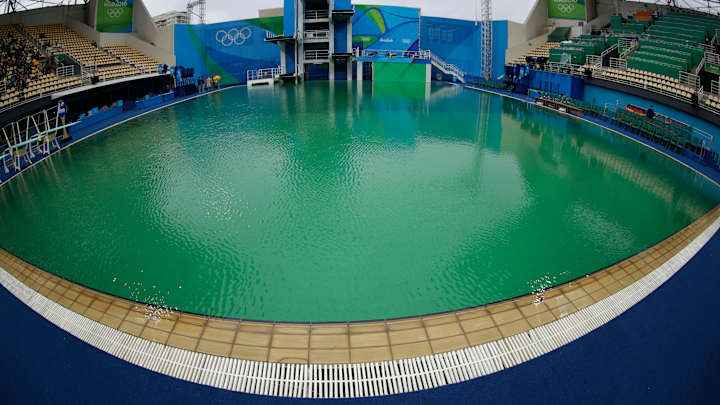Column: Not easy going green at the Olympic diving pool

RIO DE JANEIRO (AP) At these Olympics, it's not always the grass that's greener on the other side.
It's the diving pool.
Think Rio officials were embarrassed they had to hire helicopters and spotters to try and keep sewage out of sailing waters? Now they can't seem to get the green out of the diving pool water.
That led to some unusual television Friday as underwater cameras tried to focus on amoebae-like shapes that seemed more sea creature than human diver. In the stands, fans cheered when their favorite diver would suddenly emerge from what looked like green slop.
It looked bad, though Rio officials insisted it was not really all that bad. Neither, they said, was the chlorine used in the adjacent water polo pool to make it a lighter shade of green for Friday's play.
Still, this isn't exactly what they had in mind when promising the Olympics would go green.
''It doesn't take a genius to know what they did to the pool,'' U.S. water polo captain Tony Azevedo said. ''But it doesn't matter. Play in green water, play in chlorinated water, I mean I'm an American. All our water is over-chlorinated, so it doesn't really matter.''
Friday marked three days since the once blue water began turning green, and two days since Olympic officials insisted it was getting better. So much better that the pool was closed for practice Friday as they frantically tried to clean things up before the women's 3-meter springboard preliminary.
It didn't work, although the pool did smell somewhat better than it did in the morning when two German divers posted a picture on Facebook showing themselves covering their noses after practice was cancelled.
Olympic officials weren't exactly forthcoming on what made the water turn green, though those who clean swimming pools quickly identified it as algae. The officials also weren't terribly clear on how algae was somehow allowed to grow in a pool being used for the biggest sporting event in the world.
''We first learned that chemistry is not an exact science,'' said Rio 2016 spokesman Mario Andrada.
That might come as somewhat of a surprise to actual scientists, who say keeping a swimming pool clean and blue isn't that difficult if certain procedures are followed.
To them, it's easy not being green.
''There is some imprecision in maintaining chemistry in a large body of water,'' said Tom Lachocki, executive director of the National Swimming Pool Foundation in Colorado Springs, Colo. ''However, maintaining disinfectant in water has been the largest public health advance in the last century. The basic principles of maintaining disinfectant, proper pH, and circulation and filtration are scientifically sound and well established.''
Lachocki, a chemist himself, said making the pool blue again involves a combination of algaecide, chlorine and the proper pH levels.
''You get algaecide and proper chlorine and you'll see that pool clearing up overnight,'' he said. ''Within 12-14 hours you'll get cleaner water.''
Rio organizers can only hope that is true. They've battled water issues since being awarded the Olympics seven years ago with the promise they would clean up Guanabara Bay, the sailing venue that remains the collection area for much of the city's untreated waste.
They've already had to deal with a Belgian woman who won a 2012 bronze medal falling ill after sailing the polluted waters of Guanabara Bay. The last thing they need is for pictures of divers doing flips and twists into green water to be iconic images of these games.
''We certainly could have done better in the beginning to prevent the water from turning green,'' Andrada admitted. ''Once it turned green, we again made another bit of a mistake.''
It's a mistake that made more than a few divers wary, including Britain's Tom Daley, who tweeted after finding the pool closed for practice Friday that ''Hopefully that means we haven't been diving in anything too bad the last couple of days!''
Hopefully not, because the worst case scenario is always that the water is as nasty as it looks.
And no one wants to see divers turn green with anything other than envy.
----
Tim Dahlberg is a national sports columnist for The Associated Press. Write to him at tdahlberg(at)ap.org or http://twitter.com/timdahlberg
